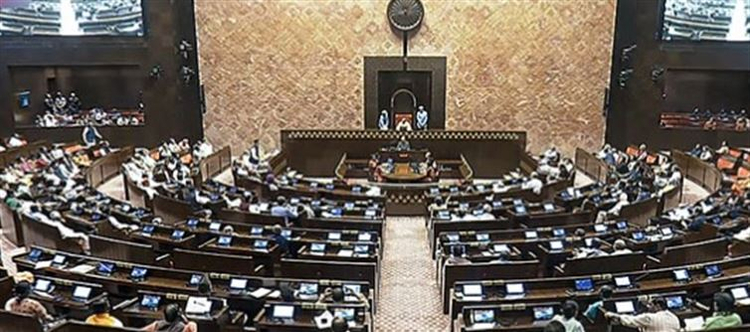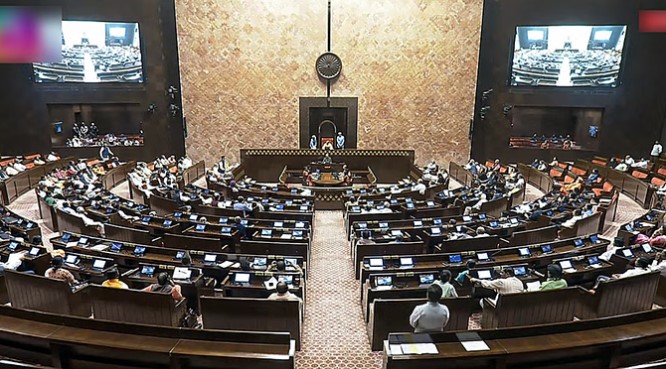
Waqf Bill: After 13 hours of deliberation, the Waqf Bill was also passed by the Rajya Sabha; 128 votes in favor, 95 against
After more than 13 hours of discussion on the Waqf Amendment Bill, the rajya sabha also approved it after 2:30 am on thursday night. The decision on the Waqf Amendment Bill 2025 in the rajya sabha was not taken by voice vote, but by division of votes. During the voting, 128 MPs voted in favor of the Waqf Amendment Bill 2025 and 95 MPs voted against it. Along with this, the Muslim Waqf (Repeal) Bill, 2024 was also passed by the Upper House.

After a long discussion of 13 hours on the Waqf Amendment Bill-Unified Waqf Management Empowerment Efficiency and Development (Umeed), the rajya sabha also approved it after 2:30 am on Thursday. Like the lok sabha, the Upper house also rejected all the amendment proposals of the opposition by voice vote. However, the amendment of DMK's Tiruchi Siva was rejected by 125 votes against 92. Earlier, the lok sabha passed the Waqf Amendment Bill by majority at around 1.56 pm on Wednesday. 288 votes were cast in favor of the bill, while 232 were cast against it. The bill was discussed in the lok sabha for more than 12 hours. The bill will now go to the President for signature and will take the form of law as soon as it is notified by the government.
Earlier, there was a heated debate on the bill between the members of the ruling party and the opposition. On behalf of the opposition, veteran leaders including mallikarjun Kharge, Ramgopal Yadav, kapil sibal opposed the bill, while on behalf of the ruling party, apart from kiren rijiju, JP Nadda, radha mohan Agarwal, upendra Kushwaha etc. took the lead.
Responding to the discussion, kiren rijiju gave a series of answers to the issues raised by the opposition. He termed the opposition's claim that the National Waqf Council will have a majority of non-Muslims as wrong. Rijiju said, there cannot be more than four non-Muslim members in a 20-member body including the ex-officio chairman. Similarly, there cannot be more than 3 non-Muslims in an 11-member state body. The Union Minister said, most of the members alleged that the JPC or the government did not accept their suggestions on the law. The government does not listen to anyone. This allegation is completely wrong. If we had not accepted the suggestions, there would not have been so much change in the original draft of this bill and the bill presented today. There is a large-scale change in the bill and it has been done on the suggestions of the members. Rijiju said, there cannot be any tampering with already registered properties, this amendment was included in the JPC on the suggestion of the opposition. Similarly, the time limit of six months for unregistered Waqf Trusts was also extended at the suggestion of the opposition. Apart from this, many amendments were taken at the suggestion of the opposition.
On the rule that only those people who have been following the Muslim religion for five years can donate their property for Waqf, Rijiju said, many members raised the question that how will the decision of a practicing Muslim be taken. I want to say that how do we decide today that a person belongs to which religion. It will be the same in future as well.
When the opposition asked why this government is interfering in the matters of Muslims, Rijiju said, why should the Modi government not do so? people have elected Modi ji to run the government. The opposition wants to remain the contractor of the matters of Muslims. The minister said the opposition is saying that the condition of Muslims is bad even after so many years of independence and there is poverty among them. After all, congress and other parties ruled for 60 years after independence, then who is responsible.
The government is not interfering in Waqf properties - Kiren Rijiju.
On the inclusion of non-Muslims in Waqf boards, Rijiju said, first of all people should understand that the government is not interfering in Waqf properties. The government will not interfere in religious institutions but the management of Waqf properties is an administrative matter and the dispute over Waqf properties is not only between Muslims and Muslims. In many places, these disputes also happen with people of other religions. In such a situation, how can there be only Muslims in the decision-making bodies? Rijiju said, that already registered properties cannot be tampered with, this change was made at the suggestion of the opposition. Similarly, the six-month limit for unregistered Waqf Trusts was also increased at the suggestion of the opposition.
Starting the discussion on the bill on behalf of congress, Syed Naseer Hussain said, the bill is against the Muslim community. The government wants to incite communal tension. Hussain said the opposition did not give place to any amendment in the JPC. With the passing of the bill, Muslims will become second-class citizens in the country.




 click and follow Indiaherald WhatsApp channel
click and follow Indiaherald WhatsApp channel